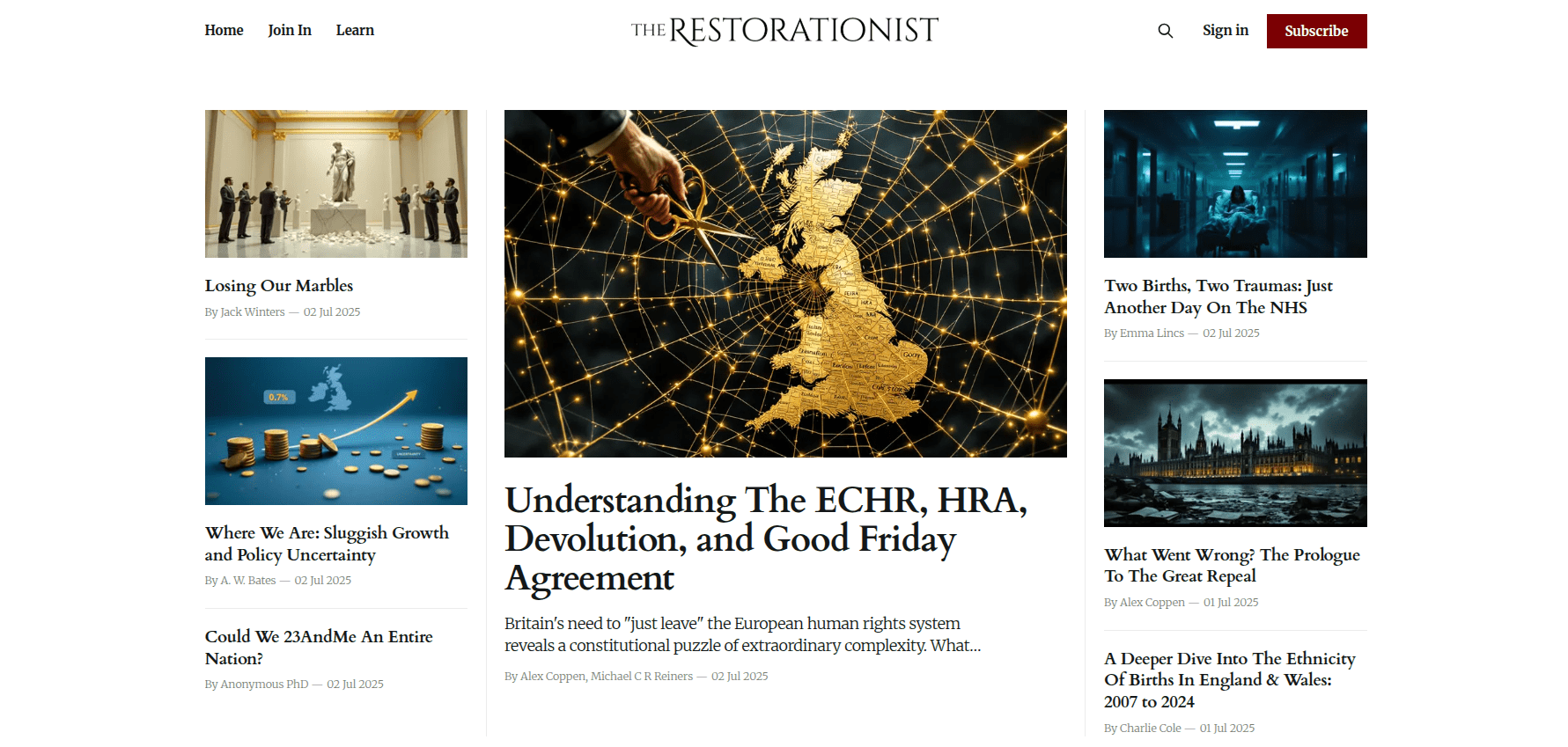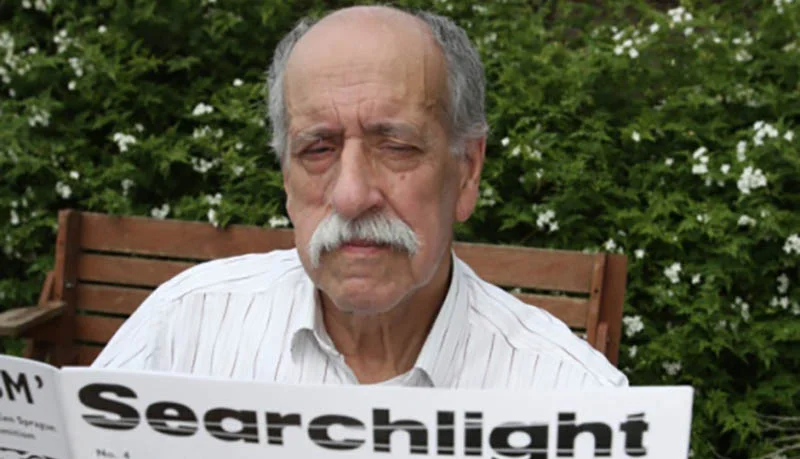Restorationist.org.uk Launched On July 4

On the day of US independence, we launched a new online publication for a new political movement, The Restorationist - https://restorationist.org.uk. In 8 weeks, it averages 40,000 visitors/readers a month, including Members of Parliament, David Starkey, and major political leaders. It has published the first two bills of the Great Repeal, and will publish the remaining five before December.
Almost all of England's revolutions have restored what has been lost. Rather than exploding a new idea into being, the Englishman has sought to repair what has eroded and decayed. Restorationism is the vision of a new future from reckless hope: what has been trampled upon can be glorious again.
Over 30 writers have now published 80 articles which have been praised for their intellectual depth and authoritative precision, including a rather vicious set of attacks on the malicious NGO "Hope Not Hate," as well as other nefarious actors.
A Doctrine Of Reckless Hope
Perceptiveness
The Restorationist sees more than present value or decay; he sees future glory and what something will be worth upon medicament. He sees through what is, to what can and will be. When he is confronted with doom, he sees the victory parade; when it is winter, he sees spring.
Sentimentality
The Restorationist is driven by love: a love for God, love for one’s country; love for one’s people; love for one’s traditions. Love for what was and what is, coupled with grief over what has been lost. His is a Burkeian world of a shared covenant between those who are dead, those who are alive, and those who are yet to be born.
Stoic Optimism
At his very core, under his cynicism and mischief, the Restorationist is a cautious optimist. His resolve and stubborn-minded will to renew what has decayed is self-evidently his choice to embrace hope over apathy or despair. He is convicted, resolved, and decided. His mind is made up.
Pragmatism
The Restorationist is not nostalgic because he aims to bring into being something new from something old. He is not an idealist; a bleeding heart; nor is he naive or magical in his thinking. Renewal requires diligent planning and costing, being fraught with opposition.
Savoir Faire
Being an Englishman, the Restorationist has a polished sureness to his cause. As a man of the world, he knows when to brandish a dagger, plant a kiss, or trigger an eruption of language. Most of all, he understands the importance of dress and aesthetics.
Are you A Restorationist?
Sense Of Loss
At his core, the Restorationist has a visceral understanding something intangible and valuable has been lost. From his people and their quality of life; his culture and the esteem of its traditions; in the integrity and practices of those he has agreed may govern; and the future his children will inherit. Unlike the conservative, he is not passively conserving or preserving what already exists as he looks back; he must recover; repair; renew; regenerate; begin anew. He must work actively as a matter of honour and wisdom, in adverse conditions, to transform what is broken or decayed, for the future.
Political Homelessness
Having lived through the digital printing press reformation of the personal computer and the Internet, the sclerotic ideologies of the last century are anachronistic and to the Restorationist. He is not of the Right, because he seeks transformation; not of the Left, because he values tradition. He is not authoritarian, as he demands non-interference; not libertarian, as he understands the necessity command. Neither is he a centrist, as he favours action. He is not a futurist, as he venerates the past; nor is there something to conserve or smash down. Ironically, the one thing he can not, and will not, restore is the dead-end ideologies of the past.
Distrust of Bureaucratic internationalism
Whether it is open society globalism, multinational corporation outsourcing, mass immigration, ideological oligarchy, NGO lobbying, the harmful disenfranchising effects of unaccountable governance by faceless bureaucrats are too self-evident for the Restorationist to deny. The nation is the widest plausible form of the third person plural (“we”), the national civil service bureaucracy, and the supranational rulemaking body are all an intolerable violation of a people’s sovereignty over their own destiny and the individual’s right to live without interference from those who are provided consent to govern.
Rejection of post-WWII excesses
The Restorationist has come to despise the destructive landslide of moral permissiveness, and no longer wishes to live in a repeating mythological storyline of grieving Nazism and magical equality. To him, the so-called endless tolerance of “liberation” slew such as postmodern nihilism philosophy, brutalist architecture, foeticide, euthanasia, race taboos, marriage cynicism, open promiscuity and prostitution, migrant violence, homosexuality veneration, racial favouritism, mass child rape, mass sexual abuse, antisemitic violence, atheist humanism, next-day divorce, cross-dressing, Nixon inflation, censorship arrests, surveillance cameras, abstract euphemisms, epidemic narcissism, and every other socio-cultural ill are the inevitable by-product of liberalism itself. He recognises and values the differences between the sexes; the beauty of marriage; the moral bankruptcy of hedonism; and the social cohesiveness of religion even if he does not practice himself.
Insistence on natural negative liberty
The Restorationist is, at his heart, a fish who swims in the waters of ancient English traditions and recognises these have created the most successful prospering nations in human history because freedom and prosperity are intrinsically coupled. Rights only make sense when existing in and of the state of nature as an uniquely individual corporeal human being, given from God; pre-existing both government or politics; out of either’s jurisdiction. Rights and liberty oblige inaction and they should be free by default from interference or external restraint, whether the offending action originates with the state or other people. He rejects entirely the modernist notion of a “social contract,” or the state has jurisdiction to issue artificial permissions such as origin-less “human rights.”
Enthusiasm for Austrian economics
The concept one can press levers to control nature trade between humans, or centrally plan the movement of economic forces, is objectively absurd to the Restorationist as attempting to manipulate the weather. Moreover, GDP is not the most important thing. As a keen analyst of historical trends (such as Singapore and Hong Kong), he rejects the invasive excesses of Keynesian economics, Nixon shock, and Modern Monetary theory for the Austrian model for as minimal interference by the state in business as possible, while favouring decentralised cryptographic systems which bypass gatekeepers. Interference by the state decreases individual prosperity because it decreases freedom, and vice versa.
Trust but verify
Unlike when the radio and television monopolised public opinion as a pulpit for weekly ideological promises, the Restorationist intuitively only trusts public figures who have rarely, if ever, changed their stance, and been the same person without pandering or flip-flopping in the political winds. He recognises, because of the folly of the “blank slate,” one’s beliefs should be considered an extension or byproduct of one’s temperament and character as a product of a time and place, formed from moral sentiment and common sense political conviction. The righteousness of one’s cause, and their loyalty to it, are separate from the purity of one’s behaviour.
Autodidactic by default
As a curious mind, the Restorationist is more self-taught than he is taught. Three-hour podcasts allow him to evaluate who an author really is; YouTube videos provide pausable instructions; eBooks live in a folder on his desktop; AI models answer his endless questions at his own pace, whether fast or slow. In an encyclopaedic universe with all human knowledge in his pocket via the smartphone, he reaches first to do his own homework before sitting at a desk looking at a blackboard to passively receive information.
Drawn to technological futurism
The Restorationist is driven by a pragmatic fascination with the possibilities technology invites to the future, not by rosy nostalgia for an arguable past. He lives in a world of instant global communication where knowledge, currency, and memory are digitised, imagining imminent exploration of Mars. What was unmade can be made again; what was ruined can be renewed; what has not been seen can be realised. His is a science fiction world immersed in perceiving how the world he leaves to his grandchildren could look, as he appreciates and values what it evolved from before.




